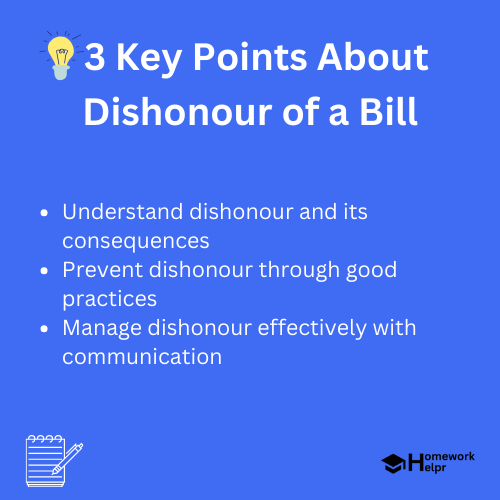📝 Summary
The dishonour of a bill arises when the issuer fails to fulfill payment obligations, leading to serious repercussions for both parties. Common reasons for dishonour include insufficient funds, account closure, and signature mismatch. Consequences may involve legal action, penalties, and credit damage, affecting relationships and trust. It is crucial to manage dishonour through effective communication, presenting the bill again, and negotiation. Preventing dishonour involves maintaining sufficient funds, checking details, and clear communication to ensure smooth financial dealings.
Understanding the Dishonour of a Bill
The dishonour of a bill is an important concept in the field of finance and banking. It occurs when a party that has issued a bill fails to meet the criteria of payment. This can lead to significant repercussions for both the issuer and the payee. Understanding the nuances of this term is crucial for students who are beginning their journey into finance and economics.
What is a Bill?
Before we delve into the details of dishonour, it’s essential to comprehend what a bill is. A bill, in its simplest form, is a written order that one party gives to another, directing them to pay a specific amount of money at a future date. Bills can take various forms, including:
- Bill of Exchange: A document representing a formal agreement between parties for payment.
- Promissory Note: A written promise to pay a specific sum of money to a particular person.
- Check: A written order directing a bank to pay a specific amount from one account to another.
Definition
Bill of Exchange: A written, unconditional order from one person to another to pay a certain sum of money at a predetermined date. Promissory Note: A financial instrument containing a written promise by one party to pay another party at a specified future date.
Examples
For instance, imagine you lend money to a friend, and they give you a promissory note that states they will pay you back $100 in a month. This note is legally binding.
Reasons for Dishonour of a Bill
There are several reasons why a bill may be declared dishonoured. Some of the most common include:
- Insufficient Funds: The account from which the payment is to be made does not have enough money.
- Account Closed: The account on which the bill is drawn has been closed.
- Signature Mismatch: The signature on the bill does not match the records of the issuer’s bank.
The dishonour of a bill does not only result in financial loss but can also lead to a loss of reputation for the issuer. This is important because trust is a key factor in financial dealings.
Definition
Insufficient Funds: A situation where an account does not contain enough money to cover a transaction. Signature Mismatch: A discrepancy between the signature on a document and the signature on file with the bank.
Examples
For instance, if you write a check for $200 but only have $150 in your account, the check will bounce due to insufficient funds.
Consequences of Dishonour
The dishonour of a bill can lead to various serious consequences. Some potential outcomes include:
- Legal Action: The payee may take legal steps to recover the owed amount.
- Penalties: The issuer might incur additional fees or penalties from financial institutions.
- Credit Damage: A dishonoured bill can negatively impact the issuer’s credit score.
It is crucial to understand that dishonouring a bill is not just a financial issue; it can also affect relationships between parties involved. Trust can diminish, and future transactions may become complicated.
❓Did You Know?
Did you know that in some cultures, a dishonoured bill can be viewed as a breach of trust that is culturally condemned?
How is Dishonour Managed?
When a bill is dishonoured, it is not the end of the world. There are several steps that can be taken:
- Notice of Dishonour: The payee must inform the issuer about the dishonour.
- Presentment: The payee can present the bill again to retrieve payment.
- Negotiation: In some cases, the parties can negotiate a new pay schedule or alternative payment methods.
Having clear communication channels can help resolve issues related to dishonoured bills more effectively. This practice fosters healthy relationships and trust in financial dealings.
Preventing Dishonour of Bills
Preventing dishonour is always better than dealing with its consequences. Here are some tips to help avoid this situation:
- Maintain Sufficient Funds: Always keep track of your account balances and ensure you have enough funds.
- Double-Check Details: Review the details on any bill before issuing it to prevent mismatches.
- Communicate Clearly: Keep lines of communication open to discuss payment timelines.
Definition
Presentment: The act of presenting a bill or check for payment at a designated place.
Examples
For instance, if you know you will be out of town when your rent is due, consider setting up an automatic payment to avoid dishonour.
Conclusion
The dishonour of a bill is a serious matter that requires careful consideration and understanding. By being aware of what a bill is, the reasons for dishonour, its consequences, and how to manage and prevent it, students can better navigate the world of finance. Remember, maintaining good financial practices not only preserves personal relationships but also supports a trustworthy financial environment. Understanding these terms and conditions ensures a smoother transaction process in all future financial undertakings.

Related Questions on Dishonour of a Bill
What is dishonour of a bill?
Answer: It occurs when payment criteria are unmet.
What are common reasons for dishonour?
Answer: Insufficient funds, account closed, signature mismatch.
How can dishonour be managed?
Answer: Notice of dishonour, presentment, negotiation.
What are tips for preventing dishonour?
Answer: Maintain sufficient funds, double-check bill details, communicate clearly.
